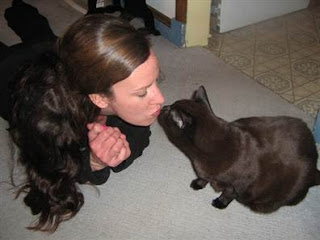Sleeping with pets carries disease risk
Unknown | 4:35 AM |
Pet Stories
Karen Curtis wouldn’t dream of kicking her cats out of her bed, or the beds of her two teenage kids. After all, the felines, named Bob and Blixa, are part of the family, and Curtis thinks it’s “very sweet” the cats make the rounds of the bedrooms, choosing to spend a few hours every night sleeping with their human companions.
“We love sleeping with our pets,” says Curtis, 45, a registered nurse who lives in Cleveland. “We’re healthy and the cats are healthy, so I don’t see a problem.”
Some veterinary scientists don’t agree.
Sleeping with and “kissing” your animals on their little pet lips puts you at risk for some serious medical problems — even when those pusses and pooches are seemingly healthy, according to “Zoonoses in the Bedroom,” a study published in the February issue of the CDC journal Emerging Infectious Diseases.
“The risk of contracting something is rare, but if you’re that person who gets a disease from a pet, rare doesn’t matter that much,” says the paper’s co-author Bruno Chomel, a professor at the University of California-Davis school of veterinary medicine and an expert in zoonoses, the transmission of disease from animal to human. “I know this will make me unpopular, but pets really don’t belong in your bed.”
Chomel and co-author Ben Sun, chief veterinarian with the California Department of Public Health, combed through medical journals to find examples of pets making people ill after sharing a bed. Among them: a 9-year-old Arizona boy developed plague after sleeping with his flea-infested cat. (Fleas are notorious plague carriers, especially in western states.) And then there’s the 60-year-old British woman who contracted meningitis after repeatedly kissing the family dog. Add in some cases of nasty parasitic and drug-resistant staph infections and it’s enough to make one purchase a futon for Fluffy and Fido.At greatest risk are the young, elderly, and those whose immune systems are compromised, such as transplant patients, diabetics and people who are HIV-positive.
Picking up a disease from the family pet is indeed rare, as the paper shows. But there are issues that you should know. Approximately 60 percent of all human pathogens could have been transmitted by an animal, according to the U.S. Centers for Disease Control and Prevention. And more than 100 of the 250 zoonotic diseases identified come from domesticated pets, says Chomel.
For example, one CDC study shows that about 14 percent of the U.S. population is infected with roundworms, leading to a zoonotic infection called toxocariasis. The mode of transmission occurs when humans come into contact with sand or soil that is contaminated with infected roundworm eggs and larvae found in dog or cat waste. Human roundworm infections, though rare, can cause blindness, among other problems.
Healthy pets carry little risk
But everyone needs to make like a cat and relax. That’s because the important message is pretty simple: Healthy pets carry little risk of disease.
The American Veterinary Medical Association doesn’t have a formal recommendation about pets sleeping with their humans. But “a little common sense will go a long way,” in reducing risk, says AVMA president Larry Kornegay, who affirms that zoonotic diseases are “uncommon, if not rare.”
“I’ve been in practice for 40 years and I see the bond between people and their pets and the positive effects pets can have on humans, which I believe outweighs any risk, whether you sleep with a pet or not,” says Kornegay, who admits his own teenage daughter sleeps with the family’s miniature Schnauzer.
Common-sense approaches include regular wellness exams for pets, parasite control, vaccinations appropriate for your geographical area, and dental care. “If people would remember to wash their hands, that would help, too,” Kornegay says.
So, obviously scrub up with soap and running water if you’ve handled feces, and do it again if you’ve handled your pet and plan on preparing food. Wash bites and scratches immediately and cover sandboxes when not in use. Try and keep your animals from drinking from toilet bowls or eating feces. And be good to your pets, by keeping outdoor areas feces-free and kitty’s litter box clean.
What’s clear is that it’s unlikely that people are going to kick their pets out of their bed. “I’m not going to put on a biohazard suit every night,” says Joseph Doles, a Cleveland veterinarian, who has six cats, some of which snooze with him and his wife.
Doles has seen "a few cases" of zoonoses during his three decades of practice and agrees that common sense and veterinary care will “further reduce an already rare risk.”
“If you have a healthy pet, you probably have a healthy family,” he says.
By Joan Raymond© 2012 msnbc.com.









0 comments:
Post a Comment